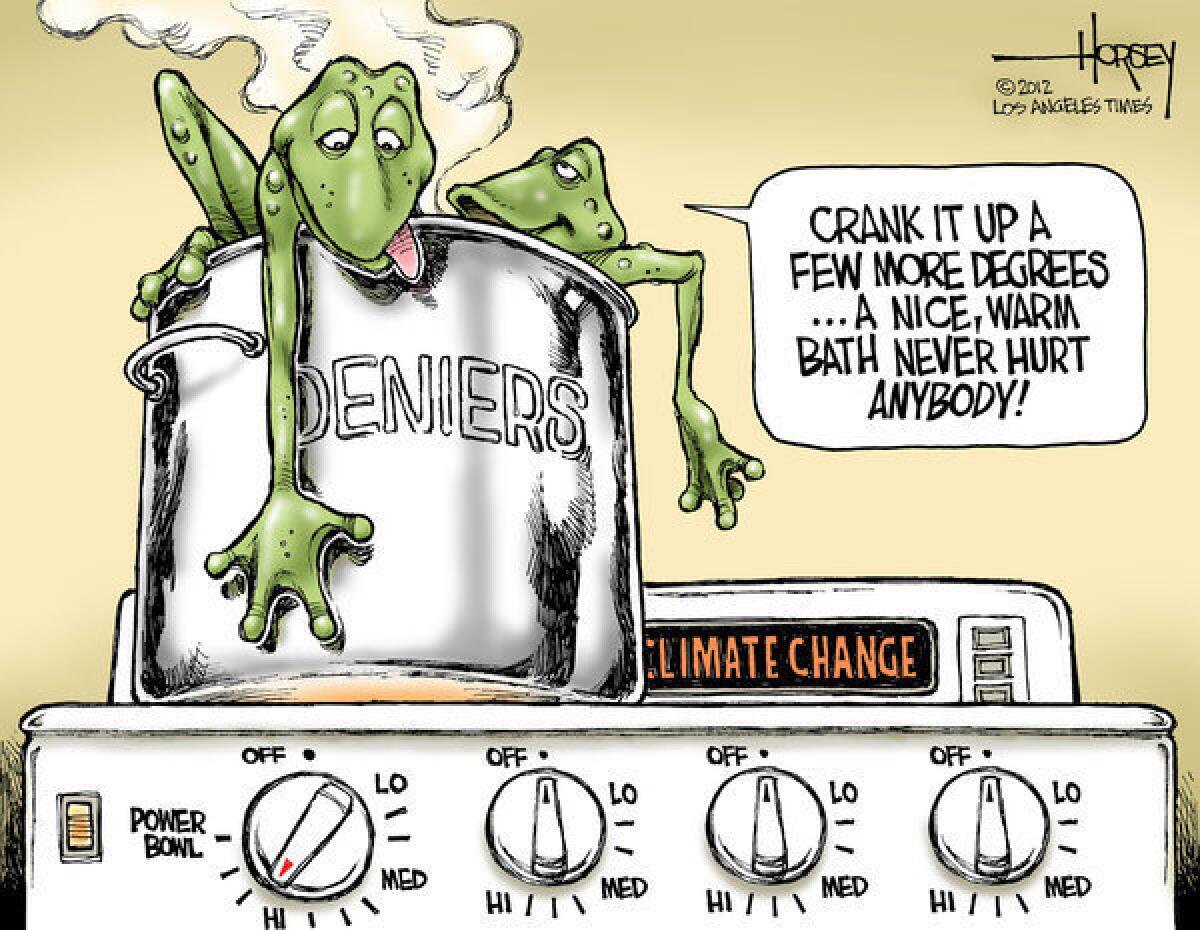Blind faith of climate change deniers endangers us all

- Share via
This week’s Newsweek magazine features a couple of essays -- one about Jesus and one about climate change -- that demonstrate the difference between simple faith in the unknowable and blind faith that denies scientific fact.
An article by Bart D. Ehrman, professor of religious studies at the University of North Carolina, Chapel Hill, discusses things that people believe about the birth of Christ that are actually not in the Bible.
For instance, despite what the Christmas carols say, nowhere in the holy book does it mention an ox and ass beside the manger or the exact number of wise men following the star (a star that seems to be operating contrary to the laws of physics, by the way).
More unsettling for those who want to take the Gospel accounts literally, the genealogies of Joseph cited in Matthew and Luke that link him to King David are at odds with each other. And the census of “the whole world” declared by Caesar Augustus that allegedly sent Mary and Joseph on a journey to Bethlehem is not mentioned anywhere in the very comprehensive bureaucratic records of the Roman Empire.
Doubters have concluded that the nativity stories are obvious myths meant primarily to connect Jesus to the Jewish messianic prophecies. Plenty of others feel no need to take every element of the Christmas story as fact. For them, the spirit of the tale is what matters most. Literalists insist anything is possible with God (including a virgin giving birth), and they have formulated ingenious ways to reconcile the discrepancies in the Gospel accounts.
Two millenniums away from the actual event, there is no way to determine perfect truth and no great harm done if folks choose to believe every aspect of the lovely story of that silent night.
Great harm is what comes from denying scientific facts about 21st century issues. That is the concern of the second Newsweek article. Written by Mark Hertsgaard, author of “Hot: Living Through the Next Fifty Years on Earth,” it documents a stark threat to mankind’s food supply:
“By 2050, scientists project, the world’s leading wheat belts -- the U.S. and Canadian Midwest, northern China, India, Russia, and Australia -- on average will experience, every other year, a hotter summer than the hottest summer now on record. Wheat production in that period could decline between 23 and 27 percent, reports the International Food Policy Research Institute (IFPRI), unless swift action is taken to limit temperature rise and develop crop varieties that can tolerate a hotter world.”
Hertsgaard takes the reader to North Dakota, where climate change has forced production of durum wheat from the east into the west of the state. Ironically, farmers are now bumping up against the oil boom in western North Dakota that is gobbling up farmland, sucking up vast quantities of water and flaring huge amounts of natural gas into the atmosphere, thereby exacerbating the ongoing rise in global temperatures that are threatening not only wheat crops, but rice and corn as well.
Yet, even though the consequences of climate change are becoming frighteningly obvious and, as Hertsgaard writes, “scientists at both the National Oceanic and Atmospheric Administration and the Environmental Protection Agency linked the record heat and drought of summer of 2012 with man-made climate change,” far too many conservatives cling to a blind faith that climate science is a hoax. Doug Goehring, North Dakota’s Republican agriculture commissioner, is typical of them all. Rather than believe the science, he says, “I believe an agenda is being pushed.”
Yes, it is -- but it is the agenda of oil companies and other extracting industries that will not let a looming peril to humanity get in the way of their profits. And it is the climate change deniers in Congress and in state governments who faithfully push that agenda and will not be dissuaded, even by a host of angels.
More to Read
A cure for the common opinion
Get thought-provoking perspectives with our weekly newsletter.
You may occasionally receive promotional content from the Los Angeles Times.










